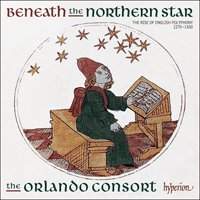Texte paru dans: / Appeared in:
|
|||||||
|
Outil de traduction (Très approximatif) |
|||||||
|
Reviewer:
Fabrice Fitch
The Orlandos’ disc, which covers some 150 years or so, is stylistically the more diverse. That follows logically but is compounded by the inclusion of some truly bizarre pieces that seem only marginally less weird in performance than on paper. The Kyrie Cuthberte is one; others include the Mass movements by Leonel Power at his more enigmatic. The Orlandos sensibly espouse the music’s rough edges (as in the Kyrie Cuthberte), courting roughness themselves in a good cause. Where a more mellifluous tone is required, as in the top-voice-driven Credo by Excetre, they give Matthew Venner’s expressive countertenor full rein. In general, the simpler chordal pieces are the most effective; the more intricate isorhythmic pieces are more uneven, in that the tenor part has not quite the solidity to anchor the interplay of the free voices above it, while the startling turns of Power’s Credo might easily have packed more of a punch. The Dunstaple set provides an island of relative familiarity before two anonymous Credos round off the recital. In the second of these, the only four-voice piece of the disc, The Orlandos throw off the tentativeness occasionally discernible elsewhere and revel in its intricate textures. The Binchois Consort’s recital is more focused chronologically, dwelling on the brief reign of Henry V and the boyhood of his unhappy successor (in that sense this new disc is a close companion and sequel to their previous offering – Hyperion, A/11). Its account of Sub Arturo plebs is more surefooted than The Orlandos’, and in general they differentiate nicely between the different styles and registers. The rollicking Agincourt Carol sounds less pugnacious than from Gothic Voices all those years ago, more an outgoing expression of grateful thanksgiving; the two isorhythmic motets by Forest are as melodically felicitous as anything by Dunstaple, who himself is represented by works of the first importance: Preco prehiminencie and Veni Sancte/Veni Creator both featured in the Hilliard’s marvellous anthology (and on a subsequent, scarcely less fine one from The Orlandos). The Binchois take both at a higher pitch and dispense with the doubled tenors that cast such a spell in the Hilliard anthology; as one steps out of its shadow, the virtues of Kirkman’s approach reveal themselves (the tweaking of tempos for the middle sections is particularly effective). Two anonymous motets in honour of St Thomas Becket are a seeming throwback to an earlier period, and are followed by three surviving movements of what must have been a complete Dunstaple Mass cycle (one of which has undergone substantial restoration). The concentration of Dunstaple’s music is one of the disc’s high points, worth the price of admission on its own: the second section of the Kyrie in particular shows off the understated eloquence of both composer and ensemble. Two other memorable aspects are worth mentioning; first the startling Latin pronunciation in the English medieval manner, which renders familiar texts virtually unrecognisable at times, and which The Binchois carry off with no perceptible discomfort; second, the exquisite photographs of English alabaster carving that form a visual counterpart to the music recorded here. Each feature in its own way deepens one’s apprehension of the culture that gave rise to it. |
|||||||






